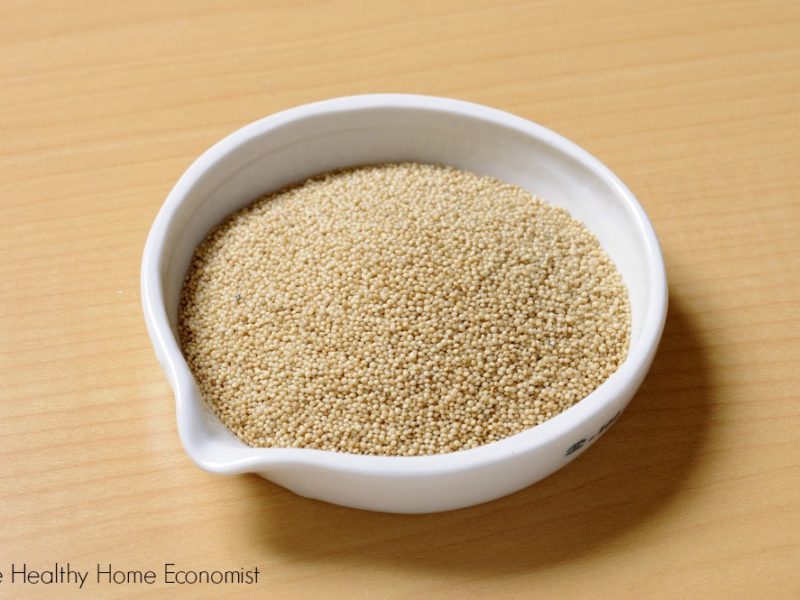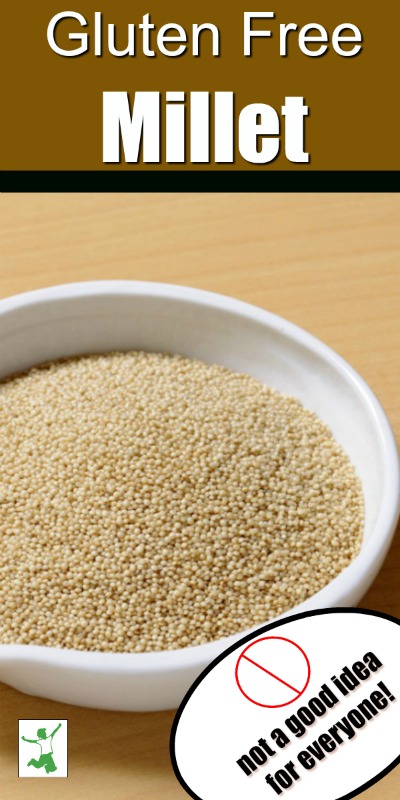Examination of why millet should optimally be eaten in moderation as a gluten-free whole grain in order to avoid disrupting hormone health.

Gluten allergies are clearly on the increase in our modern society. It seems like practically every other person I know these days has some sort of digestive issue that avoiding gluten would probably improve.
At the top of the list of gluten-containing foods is wheat. It is the indisputable, primary staple of the Western diet. Wheat is also the very foundation of the controversial USDA Food Pyramid.
Given how important bread and other wheat-based carbohydrates are to our society’s basic food requirements, it’s no wonder that folks seek a quick and easy substitute for wheat bread and wheat-based snacks when a gluten allergy or Celiac disease has been diagnosed.
Millet: Ancient Gluten-free Whole Grain
Enter millet. This ancient grain was cultivated in East Asia as far back as 10,000 years ago, according to archaeologists. Surprisingly, the cultivation of millet in prehistoric times was more prevalent than even rice, particularly in what is now China and the Korean peninsula.
Millet’s resistance to drought is perhaps the reason for its popularity in ancient times and its spread to Europe by 5000 B.C.
Despite the 5000 years cultivating this whole grain as a staple food, millet porridge is considered a traditional food in Russia as well as China. Use of millet is also widespread in Africa, like gluten-free teff, likely due to the drought-prone climate.
Millet Bread: Logical Substitute for Wheat
The protein structure of millet is quite similar to wheat. The one glaring exception is that millet is a gluten-free grain. Wheat contains copious amounts of this hard to digest plant protein.
When plain millet flour is used for baking bread (as opposed to homemade gluten-free flour or a healthy gluten-free flour mix from the store), the resulting loaf is light, white, and quite similar in texture to wheat bread. As a result, people who wish to avoid gluten tend to immediately gravitate to millet bread as the most logical and palatable substitute.
Millet bread is extremely popular in health food stores. Sami’s Bakery and Deland Bakery are two local bakeries that sell an absolute ton of millet bread to these stores around my local metro area.
I recently corresponded with a person up the East Coast of the USA who was consuming a lot of the millet/flax chips as an alternative to wheat-based snacks and had no idea of the potential health risks from consuming so much millet.
It was this discussion that led me to write this blog and warn folks about the dangers of consuming too much millet!
Potent Goitrogens
While millet does not contain gluten, it does contain goitrogens. These are substances that suppress thyroid activity and can lead to goiter. This condition involves enlargement of this very important gland which resides in the throat. Low iodine intake can also lead to goiter for those who rely on millet as a staple according to the Journal of Endocrinology and Metabolism.
Hypothyroidism is a serious and sometimes debilitating condition. It accompanies a weak or enlarged thyroid such as what occurs with goiter. Depression, difficulty losing weight, loss of hair, cold hands/feet, and fatigue are common hypothyroid symptoms. By some estimates, hypothyroidism is at epidemic proportions in Western society. (1)
Goitrogens in foods that contain them are usually reduced by cooking such as cruciferous vegetables like broccoli. However, cooking actually increases the goitrogenic effect of millet! Incidentally, the same effect occurs when fermenting soy.
Therefore, when folks begin eating large amounts of millet bread with a wholesale switch over from wheat, the thyroid suppressing effects of this simple dietary change can be profound. Injuring the thyroid can have a cascade effect on other glands as well. For example, those suffering from adrenal fatigue many times have thyroid issues as well.
Moderation is Critical
Protect your thyroid at all costs! It is a real challenge to unwind the effects of hypothyroidism once this vital gland is weakened or enlarged. Don’t take any chances with your thyroid health by consuming large amounts of millet bread or millet based snacks.
If gluten and/or wheat is a problem, then simply reduce bread consumption. Alternatively, use another grain that is both gluten-free and non-goitrogenic such as rice, oats or teff. Be sure to get quality, though, as rice is frequently high in arsenic.
Alternatively, try using grain-like gluten-free foods such as highly nutritious buckwheat, amaranth, or the starchy tuber cassava. They are excellent for baking too!
Millet bread consumption is fine in moderation if your thyroid is healthy – just don’t overdo it!
Given how difficult it is in modern society to maintain thyroid and overall glandular health, taking a chance by eating a lot of millet bread is a risky proposition indeed.
Traditional peoples did not have the constant stresses and strains on their glands like modern people do.
For example, they did not have to contend with pollution of their food, water, air and overall environment.
Therefore, we must be overprotective of our thyroid health. This includes avoiding regular consumption of foods that might impair it in any way.

Millet Alternatives That Preserve Thyroid Function
If you have thyroid issues and need alternatives to millet, here is a list of the healthiest options to consider.
- Einkorn Benefits (contains “good gluten“)
- Teff Benefits
- Yuca Root Benefits
- Arrowroot Benefits
- Wild Rice Benefits
- Farro (great if only modern wheat is the problem)








I have experienced severe pains after taking millet porridge for three consecutive days because my friend had suggezsted that it helps to supress ulcers. How after three days it turned a nightmare. Severe pains in the upper part of the abdomen like burning fire! A Ugandan lady told me that millet porridge is not good for people with ulcers or hypergastric. May be thos prepraring the millet flour mix with othe substances to make more money at the expense of our health. That the challeneg of urbanisation even in Africa, my continent.
I ate millet porridge one time and threw it all up and felt extremely ill. Plus it tastes horrid. I don’t throw up as a rule, only when I tried millet, and then gin one time, and sherry on another occasion, in my lifetime… I am in my late fifties.
Millet is featured on the site “World’s Healthiest Foods.”
http://www.whfoods.com/genpage.php?tname=foodspice&dbid=53
I’m sure your heart was in the right place but, you need to provide references. I work in research. This is the first I’ve heard of millet causing health issues. I’ve searched the web, even called a good friend who has a PhD in Health science and Nutrition. Everyone else talks about the health benefits. And My PhD Friend said Millet is a “Light” goitrogen, which matches what I’ve read online. You need to make sure the places you are finding information are valuable. While your intentions may have been good, there are people who have read this and might stop eating millet when it is actually good for them.
Thanks for the article, Sarah. I’m wondering if the consumption of high iodine foods such as kelp, seaweed, etc. might help to counter the effects of goitrogenic foods?
Before you remove Millet from your diet, do your own research. This is the first I’ve heard of millet causing health issues. I’ve searched the web, even called a good friend who has a PhD in Health science and Nutrition. Everyone else talks about the health benefits. And My PhD Friend said Millet is a “Light” goitrogen, which matches what I’ve read online. I’m not sure Sara made sure the places you are finding information are valuable.
On iodine and goitrogens. Get -adequate- iodine but don’t overdo it, because consuming too much iodine can also cause thyroid problems.
My 2.5 yr old son is allergic to wheat and intolerant to gluten and oats. We gave him a Millet flour sandwich and an hour later he broke out into hives. It was a strange reaction since he gets rashes or severe itching (eczema) when he eats (or has eaten) foods he is allergic or intolerant to.
Hi Sarah,
Thanks for the extra info on millet, but your mention of oats as gluten free is not correct, because being some one who suffers from gluten allergy, oats is also a problem for me. But you can buy special gluten free oats on the market or shops, though the cost is sky high. I love oats very much, but I have had to stop eating it because of it’s effect on my digestive organs, and it’s the same as wheat. Right now my diet consists mainly of rice; rice bread, rice cereal, just riceeeee! I can’t imagine adding more rice to my diet. Any other ideas? Thanks.
Oats are gluten free if you buy those that are not contaminated by wheat. Just because you have issues with oats does not mean they are not gluten free, it just means you have an issue with oats.
You can try sorgham, coconut flour, quinoa. Freedom foods and Bobs red mill make gluten free oats,but there can be reaction to some people.There is a misconception that the oats is contaminated with wheat but this is not the case. Some people’s immune system cannot tolerate oats and it may be worth a try as this occurs in a small number of cases. If your reactions are severe then its best to avoid.
I know this article was written in June, however I have had so many of my clients tell me that they are eating copious amounts of millet that I just had to share this post on my website. See you next week in Santa Clara! I’m so excited for this year’s conference!
Before you remove Millet from your diet, do your own research. This is the first I’ve heard of millet causing health issues. I’ve searched the web, even called a good friend who has a PhD in Health science and Nutrition. Everyone else talks about the health benefits. And My PhD Friend said Millet is a “Light” goitrogen, which matches what I’ve read online. I’m not sure Sara made sure the places you are finding information are valuable.
I’ve never researched Millet, but my mother-in-law (old-school Farm-girl and 1/2 Cherokee) always told me that if you had nothing else to eat you could survive on millet because it’s got every nutrient a body needs. I’m going to research more on this. thanks for your reply.
Thanks for the info I do eat Grain free and have been on meds for 20 years for hypothyroid..About 6 mon ago I stared using coconut oil and I have seen improvement my doc lowered my meds I was happy..learning more very day about it thanks to sites like your’s
Take turmeric for an incredible anti inflammatory